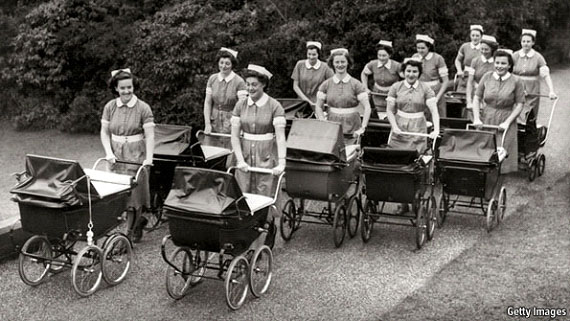『随着幼儿保育工作的职业化,其费用也突飞猛涨。』
Child-care costs:Precious little burdens
保育费:“微小”的负担
Nov 5, 2011 | From The Economist

GONE are the days when a mother’s place was in the home: in Britain women with children are now as likely to be in paid work as their unencumbered sisters. Many put their little darlings in day care long before they start school. Mindful that a poor start can blight a person’s chances of success later in life, the state has intervened ever more closely in how babies and toddlers are looked after. Inspectors call not only at nurseries but also at homes where youngsters are minded; three-year-olds follow the national curriculum. Child care has increasingly become a profession.
For years after the government first began in 2001 to twist the arms of anyone who looked after an unrelated child to register with the schools inspectorate, the numbers so doing fell. Kind but clueless neighbours stopped looking after little ones, who were instead herded into formal nurseries or handed over to one of the ever-fewer registered child-minders. The decline in the number of people taking in children now appears to have halted. According to data released by the Office for Standards in Education on October 27th, the number of registered child-minders reached its lowest point in September 2010 and has since recovered slightly.
The new lot are certainly better qualified. In 2010 fully 82% of nursery workers held diplomas notionally equivalent to A-levels, the university-entrance exams taken mostly by 18-year-olds, up from 56% seven years earlier, says Anand Shukla of the Daycare Trust, a charity. Nurseries staffed by university graduates tend to be rated highest by inspectors, increasing their appeal to the pickiest parents. As a result, more graduates are being recruited.
But professionalisation has also pushed up the price of child care, defying even the economic slump. A survey by the Daycare Trust finds that a full-time nursery place in England for a child aged under two, who must be intensively supervised, costs £194 ($310) per week, on average. Prices in London and the south-east are far higher. Parents in Britain spend more on child care than anywhere else in the world, according to the OECD, a think-tank. Some 68% of a typical second earner’s net income is spent on freeing her to work, compared with an OECD average of 52%.
The price of child care is not only eye-watering, but has also become a barrier to work. Soon after it took power the coalition government pledged to ensure that people are better off in work than on benefits, but a recent survey by Save the Children, a charity, found that the high cost of day care prevented a quarter of low-paid workers from returning to their jobs once they had started a family. The government pays for free part-time nursery places for three- and four-year-olds, and contributes towards day-care costs for younger children from poor areas. Alas, extending such a subsidy during straitened economic times would appear to be anything but child’s play.
热门推荐:
考研网校哪个好
新东方考研培训班
考研培训班
考研培训机构哪个好
考研英语网络课程
文都考研网校
北京考研培训班

